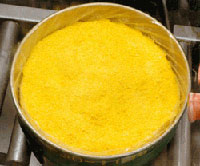Three people arrested in attempted sale of uranium in Slovakia, Hungary
Slovak police arrest two Hungarians and a Ukrainian as they allegedly tried to sell uranium in powder form, enough to be used in terrorist attacks.

First Slovak Police Vice President Michal Kopcik said the three suspects, who were arrested Wednesday afternoon in eastern Slovakia and Hungary, had just under half a kilogram (a pound) of uranium in powder form that investigators believe came from somewhere in the former Soviet Union.
"It was possible to use it in various ways for terrorist attacks," Kopcik told reporters.
Kopcik said investigators were still working to determine who ultimately was trying to buy the uranium, which the trio allegedly was selling for US$1 million (Ђ680,000).
He said police had intelligence suggesting that the suspects whose names were not released, but were aged 40, 49 and 51 originally had planned to close the deal sometime between this past Monday and Wednesday. One of the Hungarians had been living in Ukraine.
Police moved in when the sale did not occur as expected, he said.
Kopcik said three other suspects including a Slovak national identified only as Eugen K. were detained in the neighboring Czech Republic in mid-October for allegedly trying to sell fake radioactive materials. It was unclear to what degree, if any, they played a role in the thwarted uranium sale.
"According to initial findings, the material originated in the former Soviet republics," Kopcik said.
He said a total of 481.4 grams of uranium had been stashed in unspecified containers, and that investigators determined it contained 98.6 percent uranium-235. Uranium is considered weapons-grade if it contains at least 85 percent uranium-235.
The arrests heightened long-standing concerns that Eastern Europe is serving as a source of radioactive material for a "dirty bomb," which would use conventional explosives to scatter radioactive debris.
Eastern Slovakia's border with Ukraine is the European Union's easternmost frontier, and authorities have spent millions tightening security in the past few years, fearing terrorists or organized crime syndicates could smuggle weapons, explosives and other contraband into the EU.
In 2003, police in the Czech Republic, which borders Slovakia, arrested two Slovaks in a sting operation in the city of Brno after they allegedly sold undercover officers natural depleted uranium for US$715,000.
Slovak and Hungarian police worked together on the new case for several months, said Martin Korch, a Slovak police spokesman. He would not say how long the suspects were under surveillance, or detail how they were arrested and to whom they were trying to sell the material.
The Vienna-based International Atomic Energy Agency, which closely tracks reports of illicit trafficking in radioactive materials, said Thursday it was trying to contact Slovak and Hungarian authorities for more information.
Richard Hoskins, the IAEA official who administers the database, said that last year alone the U.N. nuclear watchdog registered 252 reported cases of radioactive materials that were stolen, missing, smuggled or in the possession of unauthorized individuals a 385 percent increase since 2002.
But Hoskins cautioned that the spike probably was due at least in part to better reporting and improved law enforcement efforts. Of the 252 cases, about 85 involved thefts or losses, and not all the material was suitable for use in a weapon, he said.
Even so, "there are far too many incidents of material not being properly controlled," Hoskins told the AP in a telephone interview. "If we can do a better job, we can help keep these materials from falling into terrorist hands."
Concerns about nuclear smuggling have generally been focused on Russia and countries of the former Soviet Union, where security at nuclear-related industries deteriorated after the 1991 Soviet collapse.
The U.S.-based Nuclear Threat Initiative, an organization dedicated to reducing the global threat from nuclear weapons, said in a report last year that Russia remains the prime country of concern for contraband nuclear material.
In 2006, Georgian agents working with CIA officials set up a sting that led to the arrest of a Russian citizen who tried to sell a small amount of weapons-grade uranium that he had in a plastic bag in his jacket pocket.
In 1997, seven men who officials said planned to smuggle 5 kilograms (11 pounds) of enriched uranium to Pakistan or China were arrested in the Siberian city of Novosibirsk. That uranium reportedly had been stolen from a plant in the former Soviet republic of Kazakhstan.
Subscribe to Pravda.Ru Telegram channel, Facebook, RSS!




